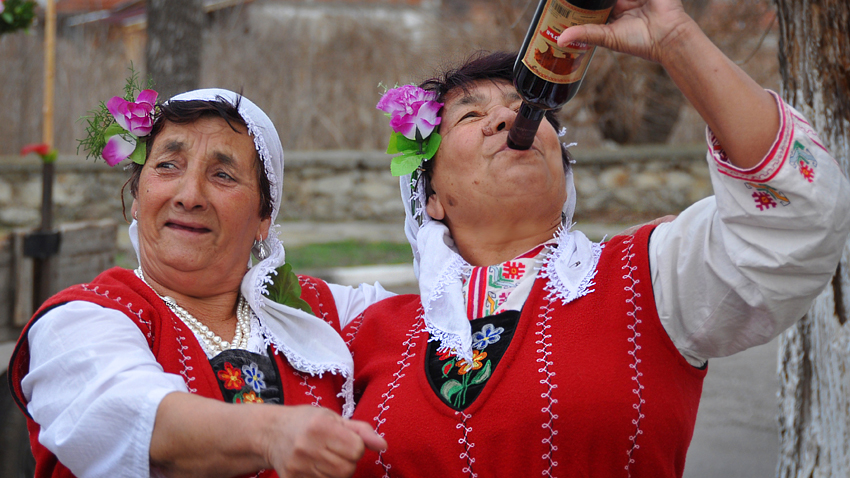 3
3
Midwive's Day (Babinden) is one of Bulgaria's most colorful folk customs. It is accompanied with a series of important rituals and a lot of fun. The feast is nowadays celebrated on January 8 in honor of the women practicing midwifery. Babinden is marked right after two other important feasts- Epiphany (Yordanovden) and the Day of St John the Baptist (Ivanovden).
All three feasts are linked with ritual bathing. According to the Gregorian calendar, Babinden is celebrated on January 21. Babinden is a female feast and in the past it was believed to be the only day when women were able to joke with men. Once, women could not say even a single word against the will of men. However, women usually joked with men at the end of the feast, when midwives completed all rituals for good health of the newly-born and the fertile women.

Celebrated Bulgarian ethnographer Dimitar Marinov provides more details about the significance of the feast Babinden. People celebrate this day to ward off the child illness, also known as Babitsi or Sardeshnitsa. According to folk beliefs, Babitsi are evil spirits-several sisters who usually attack children and very rarely the adults. All rituals held on Babinden aim at protecting children from those evil spirits.
 Three main rituals are performed on Babinden: bathing of the children by the midwife, the young mother's feast and the bathing of the midwife. On the day preceding Babinden the midwife prepares honey, butter, a bunch of wild geranium, millet and red or white wool. On Babinden she visits the houses early in the morning, bathes the babies, washes the faces of the elder children and sprinkles the lasses and the wives with water saying rituals against bad luck. She coats children with butter and honey saying blessings for sound health and longevity. The midwife also coats the women with honey and butter. Later, women with children aged three or under go to the midwife's house. Each woman brings soap, towel, a bunch of flowers and money with herself. They help the midwife wash her hands under a fruit tree.
Three main rituals are performed on Babinden: bathing of the children by the midwife, the young mother's feast and the bathing of the midwife. On the day preceding Babinden the midwife prepares honey, butter, a bunch of wild geranium, millet and red or white wool. On Babinden she visits the houses early in the morning, bathes the babies, washes the faces of the elder children and sprinkles the lasses and the wives with water saying rituals against bad luck. She coats children with butter and honey saying blessings for sound health and longevity. The midwife also coats the women with honey and butter. Later, women with children aged three or under go to the midwife's house. Each woman brings soap, towel, a bunch of flowers and money with herself. They help the midwife wash her hands under a fruit tree.
 Later, women attend a ritual lunch at the midwives' houses. No men are allowed at the celebration, except for the rebec-players and bagpipers who have the task to entertain the women. The women sing merry songs during their feast. The midwife wears a string of red hot chilies around her neck which symbolizes male fertility.
Later, women attend a ritual lunch at the midwives' houses. No men are allowed at the celebration, except for the rebec-players and bagpipers who have the task to entertain the women. The women sing merry songs during their feast. The midwife wears a string of red hot chilies around her neck which symbolizes male fertility.
Later men are allowed to join the celebrations. Women take off their fur caps, unfasten their waste-bands and pull their pants down. Men give the midwife money, in order to save them from their women.
The feast ends with the bathing of the midwife. One of the men says the following: this woman bathed all our children and now we have to give her a bath. The women reply: Yes we must bathe her! The feast is accompanied with horo chain dances and plenty of music. When the midwife goes out in the yard, two men and two women start dancing and the rest carry her to a cart filled with colorful woven. She is accompaniedby her fellow-villagers to the nearby river or fountain where the bathing ritual is held. Later they take her home. Thus, the ritual is fully completed.
English version: Kostadin Atanasov
Photos: archive and BGNES
The audio contains the following folk songs related to the fest:
1 Zaigralo Babino Oro, to the rendition of Snezhana Borisova and Kunka Zhelyazkova
2 Rodilo Se Mazhko Dete, to the rendition of Mitev Brothers
3 Snoshti Se Dete Rodilo, to the rendition of Petra Stoycheva from the village of Buhovo.
4 Sabrali Se Dve Tri Babi, to the rendition of Georgi Fershelov
5 Baba Vince Pila, to the rendition of Orpheus Orchestra from the city of Kardzhali
6 Babina Rachenitsa, performed by Vasko and Georgi Emilovi- accordion and Rumen Sirakov- mandolin
7 Babina Rachenitsa, to the rendition of Horo Ruse Orchestra
8 Golyamo Babino Horo